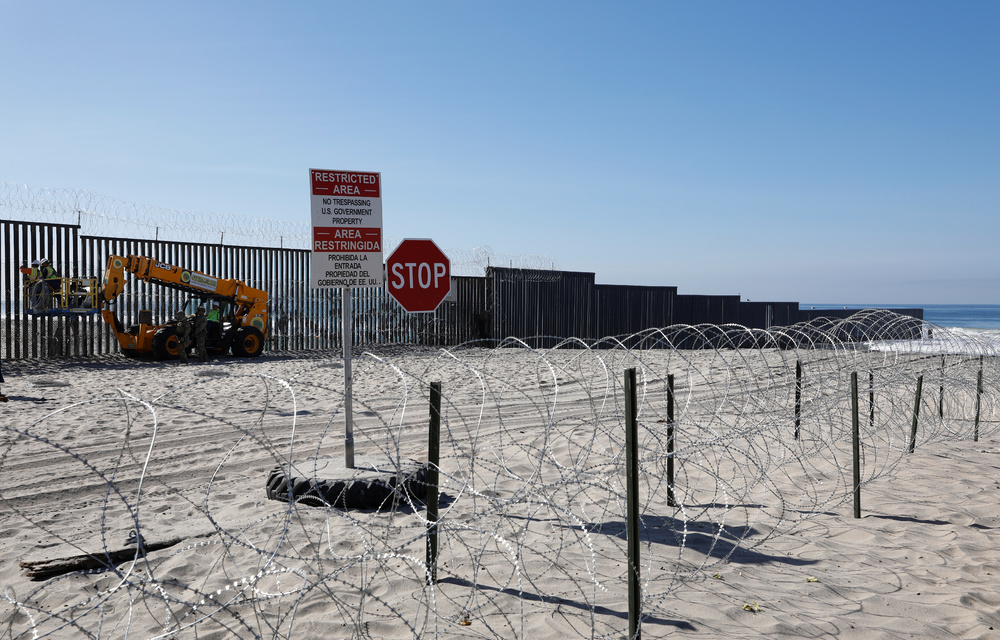
Travellers should think twice about visiting ‘the land of the free’. The border between Mexico and the US (above). Photo: Reuters/Mike Blake
For some, it’s as routine as paying at the checkout counter. For others, it’s as nerve-racking as a prostate exam and as undignified as being reprimanded in front of class. Which experience you have depends largely on one thing — where you were born.
We’re talking about international travel.
Lately, Western travellers trying to enter the US have been getting a taste of what it can be like to be a traveller from the Global South. Since President Donald Trump took office in January, there have been a number of widely publicised incidents of tourists, as well as visa and green card holders, getting a rough welcome at the US border.
Lucas Sielaff, a German tourist trying to enter from Mexico with his American fiancé, was handcuffed and shackled at the border in Tijuana, and held in detention for 16 days, before being deported at his own expense.
Another German tourist and a Canadian national on a work visa were stopped at the same border and detained for more than six weeks and 12 days, respectively, and Fabian Schmidt, a German citizen with a green card, was stopped at an airport in Boston, reportedly subjected to harsh interrogation tactics and shoved into a cold shower, naked, and ultimately sent to a detention facility.
Other incidents include a French scientist who was planning to attend a conference near Houston but was denied entry and a British artist who was held in “horrendous conditions” for three weeks.
The United Kingdom and Germany have updated their travel advisory for the US and Western travellers are thinking twice before booking a flight to “the land of the free”, which, under Trump, is experiencing a staggering descent into authoritarianism and no longer seems as free.
For German, French, British and other Western travellers, who are used to simply booking flights and strolling past immigration counters and into their favourite holiday destinations without visas or other hassles, this is a new thought process.
For travellers with “weak passports”, the struggles of crossing borders have long been a fact of life. If you are from, say, Bangladesh or Tanzania and want to visit a Western country, you might not have to literally strip naked like Mr Schmidt, but figuratively. You will probably be required to disclose your employment history and financial situation and be asked about your family, past travel and social media activities.
You also need to plan far ahead, as often it is impossible to get a timely interview appointment at the relevant embassy. According to the latest available data, the wait times for an interview for a visitor visa to the US in, for example, Abidjan, Bogota, Dhaka, Lagos, and Mexico City, are 280, 507, 288, 377 and 350 days, respectively. If you make it to the interview, you are at the mercy of a consular officer who decides whether to approve your visa application.
If you are unlucky, your visa will be refused and you’ll be handed a piece of paper that says: “Today’s decision cannot be appealed.” What you’ll not be handed, of course, is a refund for the overpriced application fee. In this situation, the consular officer is a mini dictator and the foreign traveller has fewer rights than a convicted murderer. After all, the murderer can appeal.
With regard to the US, things are set to get even worse for some travellers without the privilege of a strong passport. Trump is planning a new edition of the infamous Muslim Ban that resulted in chaos at airports, protests and lawsuits during his first term. His new travel ban could target 43 countries, more than half of them in Africa.
Many Americans will be okay with that, as people rarely question the right of sovereign nations to set their visa and immigration policies as they see fit. This is because international travel is seen as a privilege rather than a right. But is it?
Any other policy that unfairly disadvantages people based on characteristics over which they have no meaningful control, such as their ethnicity, race, sex, gender, religious upbringing or native language, would rightly be unacceptable. So, when it comes to borders, why do we accept policies that blatantly discriminate against people, mostly from poorer countries, on the basis of where they were born?
The world is more interconnected than ever and the ability to move freely is essential to being able to take advantage of the professional, educational and personal opportunities provided by globalisation — it should not be determined by a person’s place of birth.
While open borders are still a distant dream, a number of nations are resisting the temptations of xenophobia and nationalism raging in the US and parts of Europe, and have recognised that more liberal border policies are not only more moral, but also benefit the receiving nation by fostering economic growth, tourism, innovation and promoting mutual understanding between cultures.
Since 2018, Rwanda has allowed citizens of all countries to obtain a visa upon arrival without prior application. For citizens of the African Union, the Commonwealth and La Francophonie, this visa is free.
Samoa doesn’t require a visa for stays less than 60 days from anybody.
China, historically known for its strict policies, is making strides towards more inclusive immigration rules, and is cautiously opening its doors to foreign visitors. This is particularly notable because Trump seems well on his way to upstaging the US in the international arena and China might well emerge as the new leading superpower.
China has mutual visa exemption agreements with 23 countries and, since 2023, has been implementing a series of unilateral visa-free policies for an increasing number of countries. Initially, six countries — France, Germany, Italy, the Netherlands, Spain and Malaysia — were covered. This list has since grown to include 38 countries, whose citizens can enter China visa-free for business, tourism and visiting family and friends for up to 30 days.
Countries like Rwanda, Samoa and China are proving that a more open world is not only possible but beneficial for all. They’re setting a positive example that the so-called “free world” would do well to follow, instead of building ever-higher walls.
The ability to travel freely should not be a privilege reserved for the lucky few, but a right — recognition of our shared humanity and the interconnected world we live in.
Dr Guaiqiong Li is an assistant research fellow at Yunnan University in Kunming. Dr Rainer Ebert holds a PhD in philosophy from Rice University in Texas and is a research fellow at the University of South Africa. He recently completed his first trip to China.



